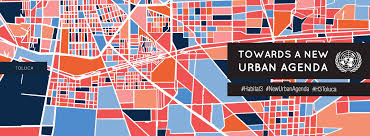
The New Urban Agenda was apted at the United Nations Conference on Housing and Sustainable Urban Development (Habitat III) from 17 to 20 October 2016 in Quito, with the participation of subnational and local governments, parliamentarians, civil society, indigenous peoples and local communities, the private sector, professionals and practitioners, the scientific and academic community, and other relevant stakeholders.
Quito Declaration on Sustainable Cities and Human Settlement for all
The New Urban Agenda represents a shared vision for a better and more sustainable future – one in which all people have equal rights and access to the benefits and opportunities that cities can offer, and in which the international community reconsiders the urban systems and physical form of our urban spaces to achieve this.
By 2050, the world’s urban population is expected to nearly double, making urbanization one of the twenty-first century’s most transformative trends. Populations, economic activities, social and cultural interactions, as well as environmental and humanitarian impacts, are increasingly concentrated in cities, and this poses massive sustainability challenges in terms of housing, infrastructure, basic services, food security, health, education, decent jobs, safety and natural resources, among others.
Quito Implementation Plan for the New Urban Agenda
Transformative commitments for sustainable urban development
- Sustainable urban development for social inclusion and ending poverty
- Sustainable and inclusive urban prosperity and opportunities for all
- Environmentally sustainable and resilient urban development
Effective implementation
- Building the urban governance structure: establishing a supportive framework
- Planning and managing urban spatial development
- Means of implementation
